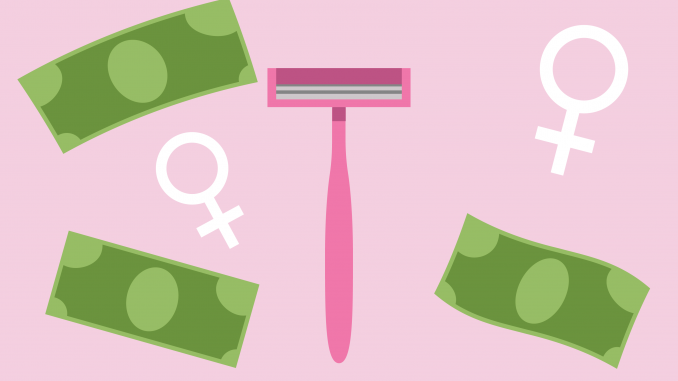
A phenomenon known as the pink tax is costing women thousands of dollars per year.
The pink tax is the extra amount women are charged for everyday products, like razors, shampoo, haircuts and tampons, according to Good Housekeeping, a women’s magazine. Often, if a product is pink or otherwise marketed in a traditionally feminine manner, it will be more expensive than its male-marketed counterpart. This phenomenon costs women approximately $2,135 per year, Good Housekeeping reported.
Jackie Golden, a junior political science and social studies education major, said she sees how the pink tax affects her everyday life.
“There’s packs of pink razors that cost way more than packs of blue razors. The only difference is the fact that they’re marketed for women and for men,” Golden said. “Then there’s almost like a stigma that goes with it if you were to buy a men’s razor. People would ask you, ‘Why are you buying boys’ products?’”
Women’s products cost an average of 7 percent more than men’s products, according to a 2015 study by the New York City Department of Consumer Affairs. By the time a woman is in her 60s, she will have lost nearly $82,000 to the pink tax, Good Housekeeping reported.
Taylor Turner, a freshman economics major, said the pink tax can target girls from a young age.
“[Companies] know that we need the products, and typically younger girls are going to be drawn to [feminized branding], especially color-wise, and if they can upcharge it without anyone noticing, they’re going to,” she said.
Some companies, however, are working to stop the pink tax. Billie, a subscription service for razors and other hygiene products, was founded on the idea that discount shaving products shouldn’t only exist for men. Their website states that women “deserve to have a great shave and no, we’re not paying more for it.”
Billie offers razors for a $9 a shipment of a handle and two razor cartridges, competing with mens’ shaving subscription services, like Harry’s and Dollar Shave Club.
Billie donates 1 percent of all their profits to charities for women, and also offers a referral service they call the “Pink Tax Rebate.” If a customer refers a friend to Billie, both customers will receive a $1 coupon to use on their next purchase, receiving a “rebate” on the money they’ve lost to the tax over the years.
In California, the Pink Tax Repeal Act, prohibits gender-based discrimination in product pricing, according to a press release from Rep. Jackie Speier (D-CA). New York is working on passing a similar anti-pink tax law, CBSN reported.
“[The pink tax] shouldn’t exist,” said Charlotte Roth, a freshman global studies major. “And it does because men are deciding.”
Seventy-five percent of Billie’s employees are female, according to USA Today, and one of its founders is a woman, unlike Gillette, Dollar Shave Club and Harry’s.
Golden thinks Billie is leading the way for companies to one day abandon the pink tax, she said.
“I feel like a lot more companies are gonna start doing it,” she said. “The more that we learn about it, the more that the companies are going to take advantage of it.”


Be the first to comment